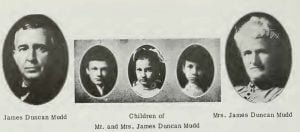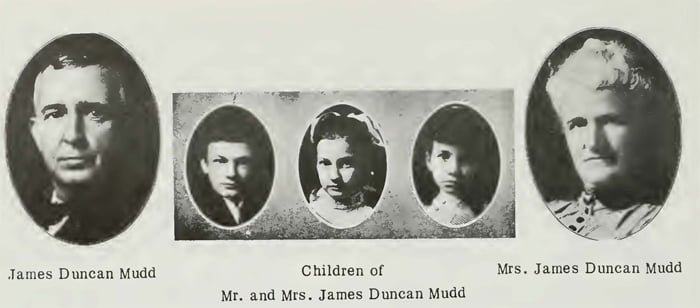The influential farmer, James Duncan Mudd of Prairie du Rocher, is a member of the oldest family of settlers in Randolph County. Indeed, his family has been in America since the very earliest days, having come over to Maryland in the time of Lord Baltimore. This band of stout-hearted Englishmen set out from their native shores in 1633 and sought religious freedom in the new world. They established the Church in North America and guaranteed religious liberty, where until then there had been only Puritan fanaticism. The Mudd family were original settlers of this colony. After the Revolution, when the tide of westward emigration set in, Thomas Mudd and his wife Johanna Carrick Mudd, proceeded to Kentucky, where they were among the earliest settlers. They settled in Spencer County. This Thomas Mudd had seven sons and two daughters, the third son being Francis. Francis Mudd was born in 1795 in Maryland, emigrated from there to Kentucky with his parents, and there grew to manhood, with such slight educational advantages as the wilderness afforded. In the War of 1812 he volunteered, and served throughout the war. He was with Jackson at New Orleans when that great general with his regiments of stalwart pioneers won one of the most brilliant victories that we ever achieved over the British. On his return he was married in 1819 to Louisa Dough, and three years later moved to Randolph County. Thus the family had been among the very first settlers of three states, Maryland, Kentucky and Illinois. Francis Mudd claimed a farm in Section 29, Township 5, Range 8, and lived here the peaceful and busy life of the pioneer farmer until his death in 1863. He has six sons and six daughters.
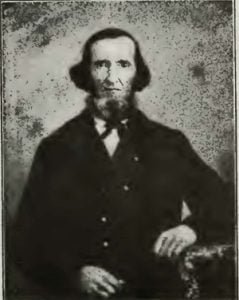
One of these sons was James T. Mudd, the father of J. Duncan Mudd. He was born on November 12, 1820, and was brought as a child to Randolph County. He was reared in his father’s log house, a building without any glass in its construction, but as a good home as any pioneer could boast. He attended a subscription school, that being the only kind in the settlement. He lived with his parents until he was employed in “breaking the prairie” near the present site of Kidd, Monroe County. In the spring of 1844 he traveled on horseback to the lead mines in Wisconsin. His fortunes as a prospector were various, but he finally returned to Randolph County no richer than he had left it, excepting for the experience, which must have been sufficiently valuable in itself. If he had done nothing else, he had proved that the adventurous spirit of the Mudd family was not dead in its latest representative.
James T. Mudd was married on January 27, 1846, to Miss Emiline E. Owen. She was of Welsh descent and of a family that had early settled in South Carolina. Her mother was an Adams, and she was born on October 6, 1825. After his marriage Mr. Mudd rented a farm in southeastern part of Horse Prairie. In 1849 he sold one of his horses for fifty dollars and bought with this money forty acres of government land. This was located one-fourth mile north of Ames Post Office, Monroe County, and he built upon it a log hut of one room. In August, 1854, he sold this tract and purchased 120 acres in Prairie du Rocher Commons. He built a home on lot 39, and lived there until his death, which occurred on July 29, 1897. His wife died on February 11, 1895. His children were; William L., Francis J., Henry F., George M., James D. and Veronica, of whom George and Henry died in youth, while Veronica died in 1899 at the age of thirty-two. The others are all married and prosperous.
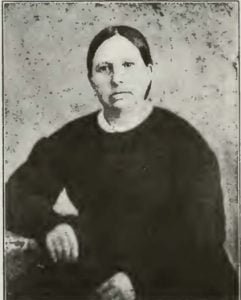
His son retains a vivid memory of the primitive agricultural devices of the pioneers. The grain was sown by hand, harvested with a cradle and threshed with a fail, or some-times trodden out by horses. It was tossed in the wind to remove the chaff. Even after all this labor there was almost no market for grain. Hogs were fattened, dressed and hauled to St. Louis or Kaskaskia, where they brought two cents a pound. The women were forced to cook at an open fireplace, and to spin and weave their clothing. In spite of these hardships, the elder Mudd was proprietor of 380 acres in 1881. He gave 100 acres each to his sons,’ William and Francis, and began to clear the forest anew. In 1897 he had 130 acres in cultivation. He was forced to go to Ruma to church, the French language being in use at Prairie du Rocher. He was a devoted Catholic and a careful father.
James Duncan Mudd
James Duncan Mudd was born on January 13, 1862, and attended the district schools until his sixteenth year. He continued his studies at night and passed a teacher’s examination, teaching for one term at the age of twenty. Then he became a farmer, at first on rented land, together with the small remainder of his father’s farm, and then exclusively on his father’s land, when that had become larger. After his father’s death he was able to buy the farm from the estate. At present he owns 440 acres and a residence with plumbing, bath, sewerage system and furnace–surely a model country home. He is the owner of an automobile and lives the life of a gentleman. He is very popular in all circles and has been on the school board for many years, as well as trustee of the Commons. He has been a stockholder and director of the Prairie du Rocher State Bank since its organization. He is the most prosperous man in his community.
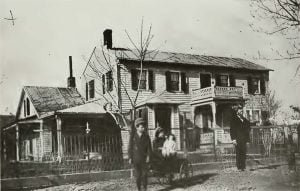
His marriage to Miss Agnes Vogt occurred on October 27, 1897. She was born in Covington, Kentucky, on November 10, 1868, being the daughter of Clemens Vogt, and was for many years the housekeeper for the priest at Ruma. Their children are Justin J., Mildred M. and Dorothea D. Mudd. The family is very devoted to the Church. Mr. Mudd was in his youth an altar boy, then a member of the choir for fourteen years, and since that time has been a trustee for six years. Mrs. Mudd is a member of the Altar Society. Both are noted for their contributions to the Church.
Mr. Mudd has all the characteristic energy and enterprise of his ancestors. He is a worthy member of a family which has helped to make the history of the nation. The restless desire for adventure and activity of the Mudd’s is his predominant trait also, while he mated with his vigor a great share of prudence and business ability. He attributes his success to the fact that he has never had an idle moment or contracted a debt which he could not meet. While he was a grain farmer his cattle and poultry always paid running expenses, while the income from the grain was a clear profit. He is one of our most successful farmers and a man who is the backbone of his community. He has always had one ideal: to do his best and place his trust in the Most High, nor has he ever been disappointed in his expectations. He is a model citizen and a good Christian.
